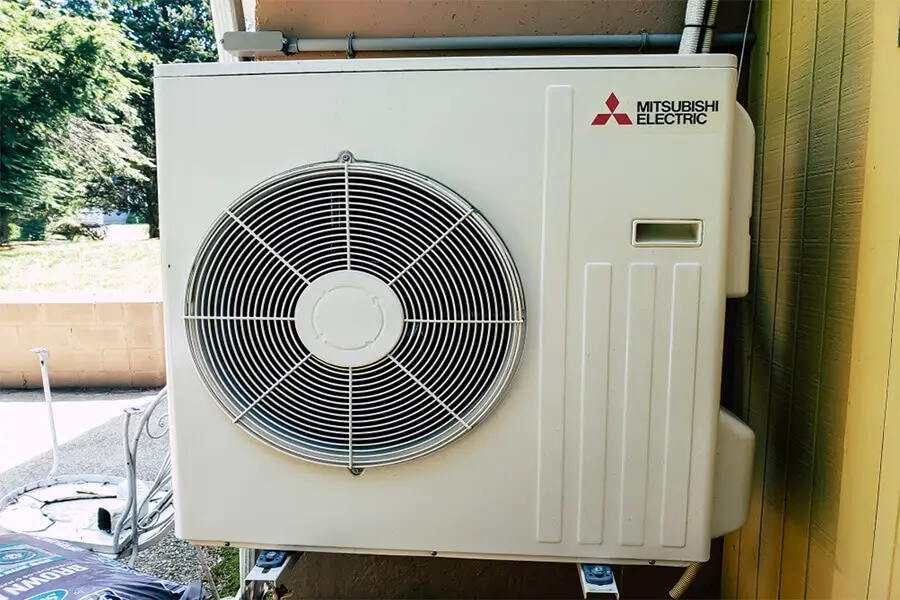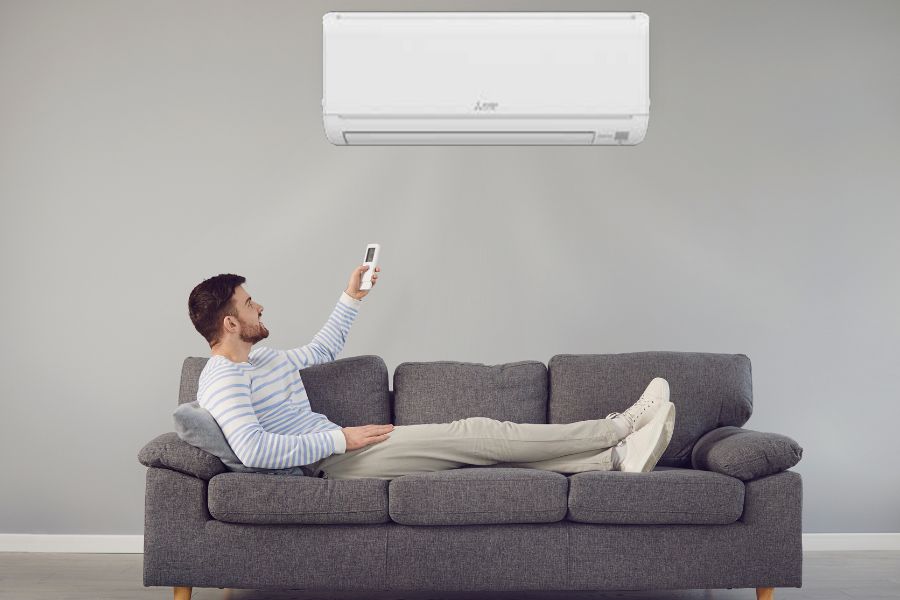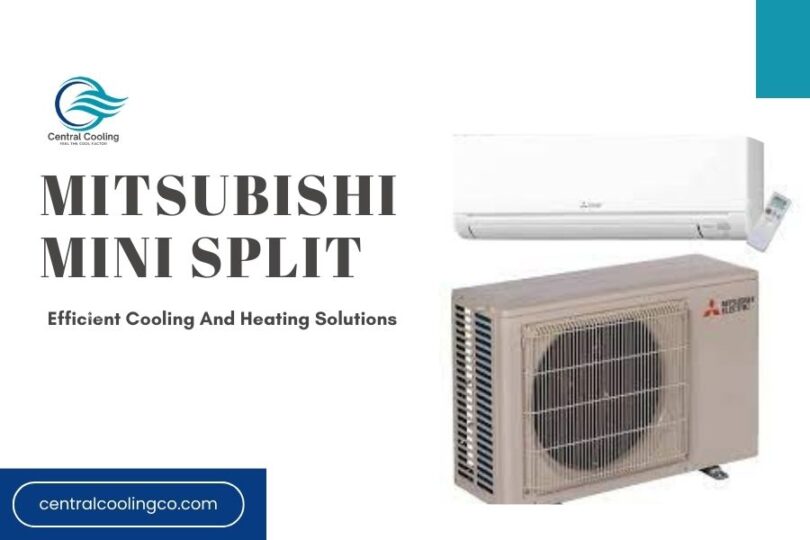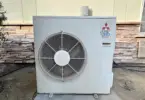Introduction:
Mitsubishi Electric has significantly contributed to heating, ventilation, and air conditioning (HVAC) technology with its innovative and productive Mini Split Systems. These systems have revolutionized how people approach indoor climate control by offering customizable cooling and heating solutions, prioritizing energy efficiency, comfort, and ease of installation. This article delves into the key features, benefits, and considerations of Mitsubishi Mini Split Systems, highlighting their technological advancements and contributions to the HVAC industry.
Understanding Mini Split Systems:
Mitsubishi Mini Split Systems, often known as ductless or split-type air conditioning systems, are intended to provide zoned heating and cooling for residential and commercial environments. Unlike traditional central HVAC systems that rely on a network of ducts to distribute air, mini-split systems utilize two main components: an indoor air-handling unit and an outdoor compressor unit. Refrigerant lines connect these components and require minimal installation efforts compared to traditional setups, making them ideal for spaces without existing ductwork or where duct installation is impractical.
Key Features And Technological Advancements:
1. Mitsubishi Electric’s Hyper-Heating Technology:
One of the standout features of this System is their Hyper-Heating technology. This innovation enables the system to provide consistent heating even in extremely cold climates. While conventional heat pumps tend to lose efficiency in colder conditions, Mitsubishi’s Hyper-Heating technology ensures the system maintains its heating capabilities, offering comfort in regions where winter temperatures drop significantly.
2. Zoned Comfort And Energy Efficiency:
Each indoor unit has its thermostat, allowing inhabitants to set the temperature to their liking. This improves comfort while saving energy by eliminating the need to cool or heat vacant regions.
3. Inverter Technology For Efficient Operation:
Mitsubishi Mini Split Systems incorporate inverter technology, which adjusts the compressor’s speed according to the cooling or heating demand. Unlike traditional systems that constantly turn on and off to regulate temperature, inverter-driven systems operate more efficiently by running at varying speeds to maintain a consistent climate. This results in reduced energy consumption and quieter operation.
4. Advanced Air Filtration And Purification:
Indoor air quality is critical for both health and comfort. Many Mitsubishi Mini Split Systems include superior filtration and purification technologies that aid in removing allergies, dust particles, and even smells from the air. This feature is especially useful for people with respiratory problems or allergies.
Benefits Of Mitsubishi Mini Split Systems:
Energy Efficiency And Cost Savings:
By offering zoned cooling and heating, inverter technology, and advanced compressor designs, these systems can yield substantial energy savings compared to traditional HVAC setups. This benefits the environment and results in lower utility bills for users.
Easy Installation And Flexibility:
The absence of ductwork simplifies the installation process for Mini Split Systems. This makes them a practical choice for retrofitting older homes or adding climate control to specific areas without extensive renovations. Additionally, connecting multiple indoor units to a single outdoor unit offers flexibility in system design.
Improved Comfort And Quiet Operation:
Mitsubishi Mini Split Systems provide consistent temperature control and minimize temperature fluctuations. The inverter technology ensures the system operates quietly without the disruptive on/off cycling associated with traditional HVAC units. This leads to a more comfortable and peaceful indoor environment.
Design Aesthetics:
The indoor air-handling units of Mitsubishi Mini Split Systems come in various designs, including wall-mounted, ceiling-recessed, and floor-standing options. This allows users to choose units that integrate seamlessly with their interior decor, providing functional climate control and aesthetic appeal.
Disadvantages Of Mitsubishi Mini Split :
Initial Cost: Higher upfront investment compared to traditional heating and cooling systems.
Complex Installation: The intricate setup and refrigerant lines require professional installation expertise.
Limited Zone Cooling: Multi-zone systems may limit simultaneous heating and cooling in different areas.
Aesthetic Impact: Indoor units can be visually intrusive if not properly integrated into the room design.
Maintenance Challenges: Regular filter cleaning and occasional servicing are necessary to maintain efficiency.
Dependency on Electricity: Operation relies on electricity; power outages could disrupt heating or cooling.
Noise Levels: Indoor units can produce noticeable noise, affecting indoor comfort.
Compatibility Issues: Specific models might not be compatible with existing HVAC systems.
Installation Location: Placement might be restricted by wall construction and available space.
Long-Term Durability: While well-maintained, mini-split systems might have a shorter lifespan than traditional systems.
The disadvantages can vary based on individual preferences, location, and specific installation conditions. It’s essential to weigh these factors against the benefits before deciding on a Mitsubishi Mini Split System.
Considerations And Installation Of Mitsubishi Mini Split Systems:
1. System Sizing And Placement:
Proper sizing of the Mini Split System is crucial for optimal performance. Calculating the space’s cooling and heating load is essential to determine the system’s appropriate capacity. Additionally, the placement of indoor units should be strategically chosen to ensure even air distribution and maximum comfort.
2. Professional Installation:
While Mini Split Systems are designed for easier installation compared to traditional HVAC systems, it’s recommended to have a professional HVAC technician handle the installation. This ensures that the refrigerant lines, electrical connections, and other components are properly installed for safe and efficient operation.
3. Regular Maintenance:
Mitsubishi Mini Split Systems need routine maintenance like any other HVAC system to guarantee longevity and peak performance. This entails filter cleaning or replacement, refrigerant level checks, and component wear and tear inspection. It is crucial to adhere to the suggested maintenance schedule provided by the manufacturer.
Is Mitsubishi Mini Split Worth Buying?
 Whether a Mitsubishi Mini Split System is worth buying depends on your needs, preferences, and circumstances. To help you make an informed decision, let’s consider some factors that can influence whether a Mitsubishi Mini Split System is a suitable choice for you:
Whether a Mitsubishi Mini Split System is worth buying depends on your needs, preferences, and circumstances. To help you make an informed decision, let’s consider some factors that can influence whether a Mitsubishi Mini Split System is a suitable choice for you:
Energy Efficiency And Cost Savings:
Mitsubishi Mini Split Systems are known for their high energy efficiency ratings. These systems can be a worthwhile investment to save on energy bills over the long term. Controlling individual zones also helps avoid wasting energy on unoccupied spaces.
Comfort And Customization:
If you prioritize personalized comfort and the ability to control the temperature in different areas of your home or building independently, a Mini Split System offers zoned heating and cooling. This feature can greatly enhance your overall comfort.
Installation Flexibility:
If your property lacks existing ductwork or you’re looking to retrofit climate control into specific areas, a Mitsubishi Mini Split System’s easy installation process and absence of ducts can make it a valuable solution. This flexibility can save you from the costs and disruptions associated with installing ductwork.
Climate Considerations:
Mitsubishi’s Hyper-Heating technology can be a significant advantage if you live in an area with cold winters. It ensures that the system can efficiently provide heating even in extremely cold temperatures, making it a practical option for regions with harsh winters.
Indoor Air Quality:
Suppose indoor air quality concerns you due to allergies, respiratory issues, or other health considerations. In that case, with advanced filtration and purification technologies, Mitsubishi Mini Split Systems can improve the air you breathe.
Aesthetic Appeal:
Suppose the design and aesthetics of your living or working space are important to you. In that case, Mitsubishi offers a range of indoor unit designs that can seamlessly blend with your interior decor.
Initial Investment:
While Mitsubishi Mini Split Systems offer long-term energy savings, the initial cost can be higher than traditional HVAC systems. However, over time, energy savings and other benefits can often offset this cost.
Maintenance And Longevity:
Like any other HVAC system, Mini Split Systems require routine maintenance to ensure peak performance and lifetime. You may expect your system to last many years if you are ready to invest time and effort in good maintenance.
Professional Installation:
To ensure safe and efficient operation, it’s recommended to have a professional HVAC technician install the system. Consider the cost of professional installation when assessing the overall investment.
Future Plans:
If you’re considering selling your property, a Mitsubishi Mini Split System can add value due to its energy efficiency, comfort benefits, and modern features.
Frequently Asked Questions:
Are Mitsubishi Mini Split Systems Energy-Efficient?
Yes, Mitsubishi Mini Split Systems are well known for their low energy use. They use inverter technology to change the compressor speed based on demand, which saves energy by avoiding numerous start/stop cycles.
Can I install A Mitsubishi Mini Split System Myself?
While some DIY enthusiasts might be able to handle the installation process, it’s recommended to have a professional HVAC technician install the system. Proper installation ensures safety, optimal performance, and warranty validity.
How Many Indoor Units Can Be Connected To One Outdoor Unit?
The number of indoor units connected to a single outdoor unit depends on the outdoor unit’s capacity and the specific model. It’s best to consult the manufacturer’s guidelines or an HVAC professional for accurate recommendations.
Are Mitsubishi Mini Split Systems Suitable For Both Residential And Commercial Use?
Yes, Mitsubishi Mini Split Systems are versatile and can be used for residential and commercial applications. They are available in various sizes and designs to accommodate space requirements and aesthetics.
Conclusion:
Mitsubishi Mini Split Systems have undoubtedly redefined the standards of indoor climate control, boasting technological advancements that cater to energy efficiency, personalized comfort, and air quality improvement. Their Hyper-Heating technology stands out, ensuring consistent heating performance even in the harshest of climates, setting a new benchmark in reliability. Moreover, the provision of zoned comfort not only enhances comfort levels but also contributes significantly to energy conservation by targeting specific areas for heating or cooling. The integration of inverter technology further optimizes energy usage, leading to quieter operation and prolonged system lifespan. Additionally, the incorporation of advanced air filtration and purification mechanisms underscores Mitsubishi Electric’s commitment to fostering healthier indoor environments. As the industry continues to evolve, Mitsubishi Electric’s dedication to innovation ensures that Mini Split Systems remain a cornerstone of modern HVAC solutions, promising dependable performance and comfort for years to come. Whether for residential dwellings, commercial establishments, or industrial settings, Mitsubishi Mini Split Systems offer a versatile and reliable solution to meet diverse climate control needs, reinforcing their position as a frontrunner in the HVAC landscape.
Disclosure: We may get commissions for purchases made through links in this post.








